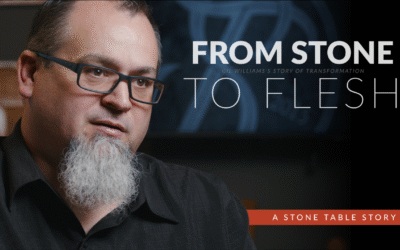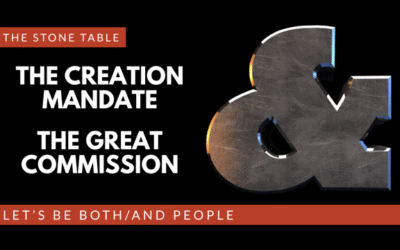<iframe width="560" height="315" src="https://www.youtube.com/embed/zYzDGyXLhj8?rel=0&showinfo=0" frameborder="0" allow="autoplay; encrypted-media" allowfullscreen></iframe>
How Missionaries Became My Evangelism Teachers

Most of us genuinely believe in the power of the gospel.
We have experienced it.
We have watched it touch parts of our lives that no self-help book ever could. Some of us can even point to the exact moment Jesus interrupted our story.
But believing the gospel and sharing the gospel often feel like two different worlds. We love Jesus deeply, yet the moment we imagine bringing Him up at work, something tightens inside. There is a gap between our personal experience with Christ and our public witness for Him, and for many Christians, that gap feels wide.
Barna reported in 2025 that 95% of American Christians have never led someone to Christ.
Not because they are apathetic.
Not because they lack desire.
But because fear quietly fills the space where courage should be.
“I do not want to be that person who comes off pushy.”
“What if I ruin the moment?”
“How do I even bring up Jesus without crossing a professional line?”
“What if it affects my career?”
“What if someone sees me in traffic ten minutes later?”
In other words, we long to share our faith, but we are not sure how to do it well.
Jesus entrusted the Great Commission to all of us, in every vocation and every environment. Over the years, I have learned a great deal from missionaries about evangelism. Their lives have taught me that being a witness flows out of three postures long before it becomes a conversation.
How we see people.
How we walk with people.
How we shine among people.
These three lessons have reshaped the way I think about witness. And they can reshape the way we step into our workplaces, neighborhoods, and daily conversations.
Let’s explore them together.
- How We See People: The Handiwork of God
John Wooden, the legendary UCLA coach, led teams to ten national championships in twelve years and an 88 game winning streak. Yet the most remarkable thing about Wooden was not strategy or trophies. It was the way he saw the young men he coached. He did not see athletes to shape. He saw sons to form.
He looked beyond performance and into personhood.
This is exactly where Christian witness begins.
Not with speaking.
With sight. Specifically, how we view others.
Ephesians 2:10 says,
“For we are God’s handiwork, created in Christ Jesus to do good works, which God prepared in advance for us to do.”
The Greek word for “handiwork” is poema, a term that implies artistry, intention, craftsmanship. It suggests that God sees each human life as a poem He authored, a work of beauty embedded with deep meaning.
Missionaries intuitively grasp this. They do not step into Libya or Turkey or Little Somalia in Minneapolis and say, “These people are too far from God.” They enter those places because they believe those people are masterpieces waiting to be reclaimed.
This type of thinking shouldn’t only exist overseas. It belongs in your office, your classroom, your neighborhood, and even in your text messages.
Matthew 9:36-38 gives us a window into how Jesus saw people.
“When he saw the crowds, he had compassion on them, because they were harassed and helpless, like sheep without a shepherd…”
The Greek word for “compassion” is splagchnizomai, a term that conveys a deep movement of the gut. In the first century, the gut was understood as the seat of emotion, meaning Jesus did not simply feel pity. He felt moved down to His very depths.
Why? Because He saw something others missed.
He saw their suffering.
He saw their lostness.
He saw their stories, not just their actions.
The crowds Jesus addressed were Jews living under Roman oppression, taxed heavily, policed harshly, and carrying centuries of unfulfilled messianic longing. When Jesus looked at them, He did not see political categories or problematic personalities. He saw sheep without a shepherd, aching for direction and aching for hope.
This matters because how you see people determines how you treat people.
If you see a coworker as annoying, you will avoid them.
If you see them as burdensome, you will dismiss them.
But if but if you see them as God’s poema, even on their worst days, your instinct becomes compassion rather than confrontation.
Dietrich Bonhoeffer captured this beautifully. “We must learn to regard people less in light of what they do or omit to do, and more in the light of what they suffer.”
Our witness begins long before we speak. It begins when we see.
- How We Walk with People: The Ministry of “With”
When many Christians think about evangelism, they imagine words. Crafting the perfect explanation of the gospel, remembering the right verses, avoiding awkward moments. But in Scripture, one of the most profound forms of witness does not begin with words at all.
It begins with presence.
John 1:14 says, “The Word became flesh and made His dwelling among us.”
The phrase “made His dwelling” comes from the Greek word skenoo, meaning “to pitch a tent.” For first century Jews, this word evoked memories of the tabernacle, the place where God dwelled with His people during the Exodus. John is making a staggering claim: Jesus became the new tabernacle, and he moved into the neighborhood where every kind of human mess, dust, pain, and ordinariness existed.
This was not accidental. Incarnation is the ultimate “withness.”
I once mentored a young pastor who complained about how “messed up” a corner of our city had become. He avoided it. He talked about it like it was foreign soil.
I asked him, “Why is it that we celebrate missionaries who go overseas to love difficult places, but we turn up our noses at broken people in our own city? Why do we fly across oceans but will not cross a street?”
He did not have an answer.
The ministry of “with” is one of the most Christlike things we can ever offer another person.
And it applies directly to the everyday spaces we inhabit. You can:
Help the office admin unpack thirty Amazon boxes.
Check in on someone drowning under a deadline.
Affirm someone’s unseen effort.
Sit with someone who is anxious before a presentation.
Share lunch with the person always eating alone.
These small acts cut through isolation and reflect the God who drew near to us.
John Stott once wrote, “People listen to our words only when they can see our love.”
This is not about treating people like projects.
It is about being present in their story the way Jesus was present in ours.
- How We Shing Among People: The Light of Integrity
A missionary friend of mine lives in a closed Muslim run nation, where corruption is woven into society. To reach people there, she opened a business. It was not a gimmick. It was real. And in this country, corruption is simply how things get done.
During tax season, officials offered to adjust her inflated bill for a bribe.
She refused. She paid the full amount. And she does so every year.
Now she is known in her city as the business owner who will not compromise. People respect her. People question her. People want to know why she is different.
Her integrity created curiosity, the soil where spiritual conversations grow.
This is what Jesus was getting at in Matthew 5:16. “In the same way, let your light shine before others, that they may see your good deeds and glorify your Father in heaven.”
To modern ears, light sounds poetic. But to Jesus’ original audience, first century Jewish listeners gathered on a Galilean hillside, light was more than metaphor. It tied directly to the role of Israel. Israel was meant to be a light to the nations, a people whose obedience and justice revealed Yahweh to the Gentile world.
Jesus was saying, “Fulfill the vocation Israel always had. Let your visible goodness point others to the invisible God.”
Not through loudness.
Not through forced spirituality.
Through a life marked by integrity, gentleness, generosity, and consistency.
Jesus understood something we often overlook.
Credibility is the currency of witness.
Dallas Willard said, “The greatest threat to the church today is not unbelief but the failure of believers to live what they say they believe.”
People are drawn to light, not noise.
And they ask “why” only after they see something different in you.
Why are you calm when others panic?
Why do you show patience when everyone else complains?
Why do you treat delivery drivers like human beings?
Why do you thank people who usually go unnoticed?
Why do you choose gentleness over outrage?
Why are you faithful when loyalty seems outdated?
Those questions, those moments of curiosity, become sacred openings.
But behavior alone is not enough.
Deeds display the gospel.
Words declare it.
When someone finally asks why, you do not need a theological dissertation. You just need a sentence of courage.
“Honestly, it is because of what Jesus has done in my life.”
Eugene Peterson once said, “The light we give off as followers of Jesus is not the glare of self-promotion but the glow of grace.”
And that glow is what the world is starving for.
The Invitation Ahead
Tomorrow, you will step into a workplace, a school, a neighborhood, or a Zoom meeting. You will answer emails, sit in traffic, interact with real people, and navigate real responsibilities. And in all those moments, you will have an opportunity. Not to preach a sermon, but to live one.
You do not need to manufacture brilliance.
You do not need to have all the answers.
You do not need to be perfect.
You simply need to reflect the One who already shines.
The world does not need your spotlight.
It needs His reflection.
And He has chosen you to carry it.

Bill Tibbetts
Bill Tibbetts is the Vice President of Education and Multiplication at The Stone Table, bringing over two decades of experience in higher education to his role. As the former Dean of the College of Business and Technology at North Central University, he developed a deep passion for mentoring, missions, and business consulting. Bill's extensive expertise uniquely positions him to lead initiatives that encourage marketplace believers and college students to actively engage with the Great Commission. He also serves on the board of the Community Reinvestment Foundation and is based in Minneapolis, MN, supporting The Stone Table's expansion into new regions.



